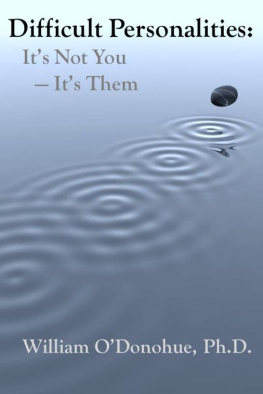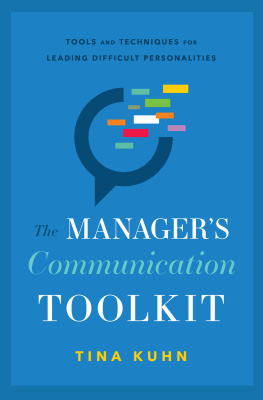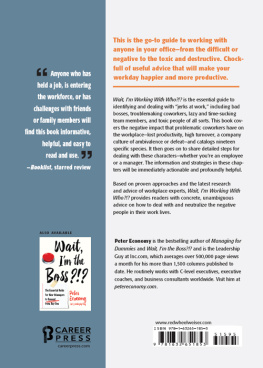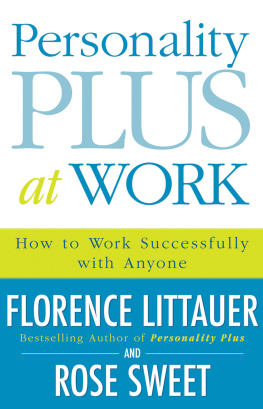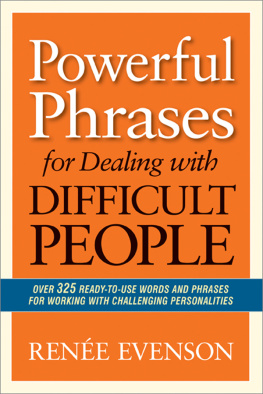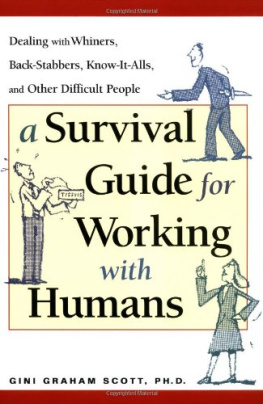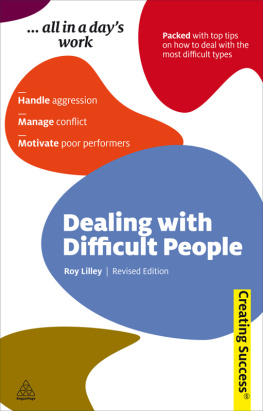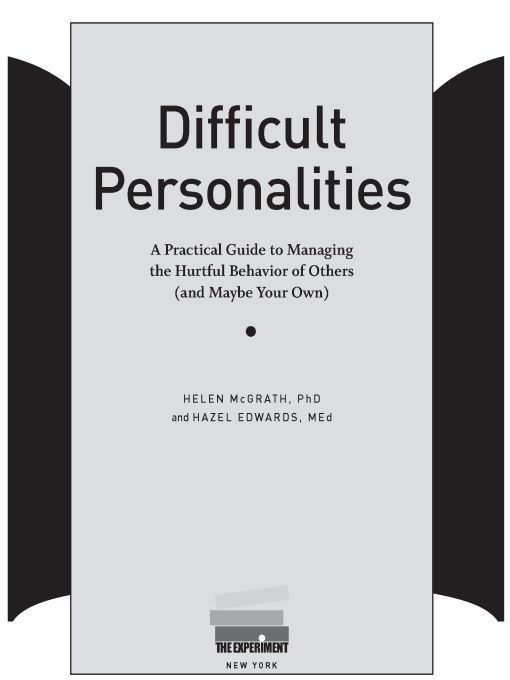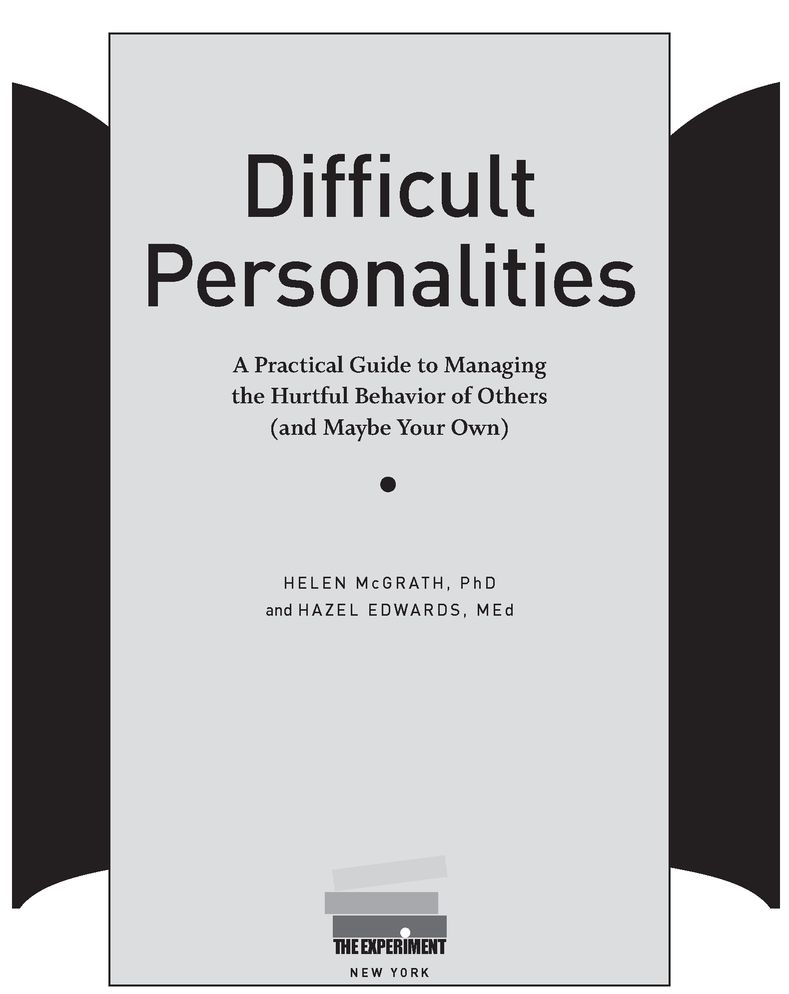Table of Contents
Introduction
GENERAL PRINCIPLES UNDERPINNING THIS BOOK
DO YOU HAVE a difficult personality in your life? Would others consider that you are their difficult person? In this book we have turned the microscope on difficult types of personalities and patterns of behavior, which range from annoying and confusing to the seriously damaging.
Like most of us, you have probably encountered situations with family, friends, coworkers, or associates who have hurt you. Either they have damaged you emotionally or financially, or their behavior has caused ongoing distress or worry. Understanding how people think and knowing some of the reasons for their patterns of hurtful behavior will take you part of the way toward handling your difficult relationships more successfully.
People sometimes do not reciprocate our feelings, fail to appreciate our worth, fall out of love with us, betray, leave, retrench, or disappoint us. These are all part of the pain of being human and do not necessarily reflect people being difficult. But some people have ongoing behavior patterns that hurt many others. They leave behind more than one hurt or troubled person because of their difficult personalities.
What exactly is personality? Each person has a unique personality. It is best described as a relatively enduring and predictable collection of personal qualities (traits) and patterns of behavior. We can also talk about personality types. These are categories of personality that are very similar and are composed of predictable combinations of traits and behavior patterns.
Some people have a mildly difficult behavior pattern while others have moderate or very difficult behavior patterns, and the effect of these patterns on others may also range from minor to severe.
Here are some of the guiding principles we have used in identifying and elaborating on these difficult patterns.
Nobodys Perfect
All of us have people in our lives who hurt, frustrate, or annoy. But most of us occasionally hurt others as well. An understanding of the reasons for our own behavior means we are in a better position to improve relationships. Skills can be learned and strategies applied to help you deal more effectively with both the distressing behavior of others and your own hurtful behavior.
Dont feel distressed when you recognize yourself in one or more of the patterns or anecdotes. Weaknesses and limitations are universal. Probably everyone who reads this book will fit a pattern, at least in a mild way. As Sigmund Freud once said, even normal people are not all that normal!
Some People Hurt You Because Some of Their Personality Traits Are Incompatible with Yours
Some people cause us frustration and annoyance because their behavior differs so much from our own. Their hurtful behavior is an indirect outcome of perceiving the world differently and/or having different interpersonal styles. By implication, of course, we cause them distress, too. In general, the more we are alike, the easier it is to get along. Too much alikeness, though, can lead to stagnation. How extroverts and introverts cope with each other and how, from different perspectives, thinkers and feelers work things out, is explored in this book. We also look at what happens when planners try to work and live with people who like to be more spontaneous and go with the flow.
Some People Upset You Because Their Behavior Patterns Annoy and Frustrate
The intentions of people with annoying personalities are usually not selfish, mean-spirited, exploitive, or hostile. The categories of annoying personalities in this book are based on different combinations of ignorance, interpersonal difficulties, selfishness, coldness, insensitivity, immaturity, faulty thinking, pettiness, and low self-esteem. These are:
bossy people
people who consider themselves superior
negative people.
Some People Cause Trouble and Confuse Themselves and Others Because of Their Personality
Two kinds of personalities are discussed in this category. Those with anxious personalities can sometimes confuse, hurt, and distress as a result of their attempts to deal with their own emotional difficulties, which have a strong biological component. Demanding personalities are so terrified and affronted by rejection or what they see as abandonment that they behave in outrageously demanding ways and sometimes take spiteful revenge on those whom they see as having denied them.
Some People Hurt You Because Their Behavior Patterns Are Very Damaging
Some personality types have toxic behavior patterns that frequently damage many others or cause pain, usually to an intense degree. Either their intention is to harm, or they are prepared to hurt you in order to get what they want. The personality types discussed in this category include:
passive-aggressive people
bullies
everyday sociopaths.
People with these personalities find it difficult to change, and often they dont want to. They are getting what they want, but at your expense. As a result of their painful behavior, they alienate others, but that doesnt worry them. They are not generally distressed by their own behavior. These personality types usually show up from late adolescence onward, although there are exceptions in which there are earlier signs of the pattern. These patterns can be most easily identified in close relationships.
Some People Hurt Others Because They Have Poor Relationship and Coping Skills
Lack of effective relationship skills can indirectly cause pain. If our own relationship skills are also poor, we double the distress. Our lives are spent learning and refining the skills we need in relationships. Managing angry feelings, handling conflict constructively, not personalizing things too much, negotiating, validating, being empathic, respecting, and staying positive and optimistic are all such skills. Unskilled people may be simultaneously wrestling with behavior patterns, such as anxiety, which make it harder. Others may have had poor family models and need more opportunity to learn elsewhere. People dont change easily, but once the intention has been formed, they can. In Part V there are practical guidelines for improving your own relationship skills. They may also be a useful offering to someone you care about who needs to improve their relationship skills.
The DSM-IV-TR Is the Guide
Much of the material in this book is based on the categories of behavior disorders outlined in the DSM-IV-TR. The full title of the DSM-IV-TR is the Diagnostic and Statistical Manual of Mental Disorders, Fourth Edition, Text Revision (2000), and it is published by the American Psychiatric Association. It represents the results of the research and clinical experience of over one thousand psychologists and psychiatrists, as well as the contributions of numerous professional organizations involved with emotional health issues.
The DSM-IV-TR is a guide to diagnosing mental disorders. These are behavioral patterns and personality disorders that an individual displays and that are associated with distress or dysfunction. Dysfunction is about how much the pattern of behavior interferes with an individuals life, work, schooling, social activities, partner, and family. It can range from minor to very severe, and it inhibits maturity, progress, and day-to-day functioning.


